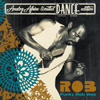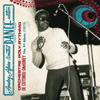
These two albums mark the beginning of Analog Africa's new "Limited Dance Edition" series, veering away from compilations into reissues of long-deleted full albums by artists that played an integral role in shaping founder Samy Ben Redjeb's aesthetic. The endeavor is off to an excellent start, adding some strong rarities to the available oeuvre of one of the milieu's best-known bands and unearthing an absolutely killer effort from the amazing but seldom heard Rob.
I first heard Rob on 2002's Ghana Soundz compilation and his "Make It Fast, Make It Slow" has been in fairly heavy rotation around my apartment ever since (though I still can't decide if his orgasmic moaning is just uncomfortable or so uncomfortable that it is actually awesome).  Since then, only two other songs of his have popped up (and he was only a mere bonus track on Analog Africa's own Afro-beat Airways compilation).  Consequently, I knew practically nothing about him other than the fact that he is "enigmatic" and that he got arrested for tax evasion before Redjeb could interview him for the Airways liner notes (googling "Rob" didn't seem like it would be very helpful).  Fortunately, this album answers most of my questions and deepens my respect for Robert "Roy" Raindorf's artistry.  Also, aside from one puzzling misstep, the album is absolutely stellar.
Rob's career was largely built upon a foundation of good taste and sheer force of will, as he fell in love with American soul, quickly learned to play the piano, and set out to find the best possible band to back him (and they needed to have a horn section, which was not at all common in Ghana). He eventually found the perfect match in an army band called Mag-2 and they began making some very funky and heavily Americanized music together.  The partnership was a near-perfect confluence of forces, as Mag-2 was an extremely tight and talented band and their army connection ensured that they had better gear than everyone else.  Also, their founder, Amponsah Rockson, was a very talented and savvy arranger.  He essentially took over the musical reigns, which was a good move, as composition was not Raindorf's strongest attribute. That is not to say that Rob was extraneous in his own band though– far from it. Rob's contribution was that he got them into playing sexed-up American funk and soul and that he was freed up to just be an extremely cool and charismatic frontman (which he excelled at).
Funky Rob Way differs from a lot of other '70s African funk albums in many ways.  The most obvious one is that Rob sings in English, but the music is also extremely punchy, laid-back, and stripped-down.  There is no unnecessary clutter or meandering here and the production is appropriate clear and bass-heavy.  Aside from the weirdly psychedelic ballad "Your Kiss Stole Me Away," Funky Rob Way is an unwaveringly infectious cocktail of slinky grooves, sultry wah-wah guitar, catchy horn hooks, and awesome percussion.  Even without Rob, this would be great, but his sheer character and presence elevates this album to "classic" status.  Which is high praise from me, as I am not normally amenable to be being repeatedly assured that an artist is funky nor do i like being exhorted to boogie.  Lyrics are important to me.  Rob is a different story though– he delivers his James Brown-isms with a conviction that is impossible to resist.  Nothing is silly or trite if it is delivered with enough style and urgency.  Rob and Mag-2 got pretty much everything exactly right here.  This is a major event in the world of African music reissues.
samples:

The first Orchestre Poly-Rythmo album dates from 1973 and was originally released on Albarika Store, which was the band's primary label.  Notably, Analog Africa has already released a compilation of OPR's Albarika Store highlights from the '70s and none of these four songs were on it.  It is not clear why that is the case, but the original album is apparently extremely rare.  Even rarer still, for obvious reasons, is the first version of the album, which the label rejected for sound quality issues.  This reissue combines takes from the two sessions, but I have no idea how they split nor do I notice a marked difference in recording quality.  Regardless, everything here is likely to be completely new for anybody that is not a Beninese record collector.
Aesthetically, The First Album is much closer in tone to the band's guerilla recordings from the Vodoun Effect than it is to their cheerier, more commercial Albarika recordings.  Quality-wise, it gets a bit complicated.  Everything that I like about the Orchestre is present (funky bass lines, sinuous grooves, and unusual percussion), but these songs are pretty lacking in the infectious hooks or over-exuberant organ riffing that characterize their best work.  Also, the production does not play to the band’s strengths–music this rhythmic should have a visceral impact, but the low-end is pretty neutered here.  Still, these four songs are all quite solid, making this the most consistently enjoyable OPR reissue so far, despite not quite hitting the highs of some of their later work (though the closing "Egni Miton?  Nin Mi Na Wa Gbin" is quite excellent).  This is a welcome addition to the band's discography and probably a good starting point for the curious, but it is not a lost masterpiece or anything.
samples:
Read More

